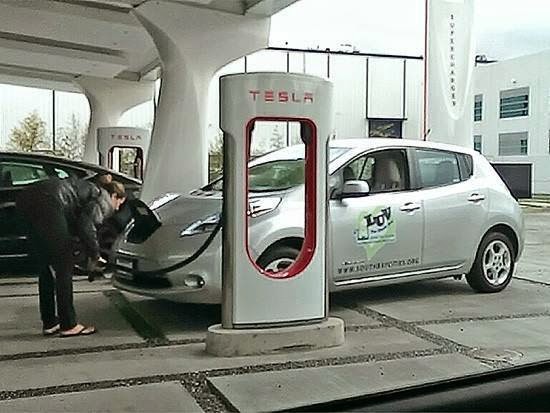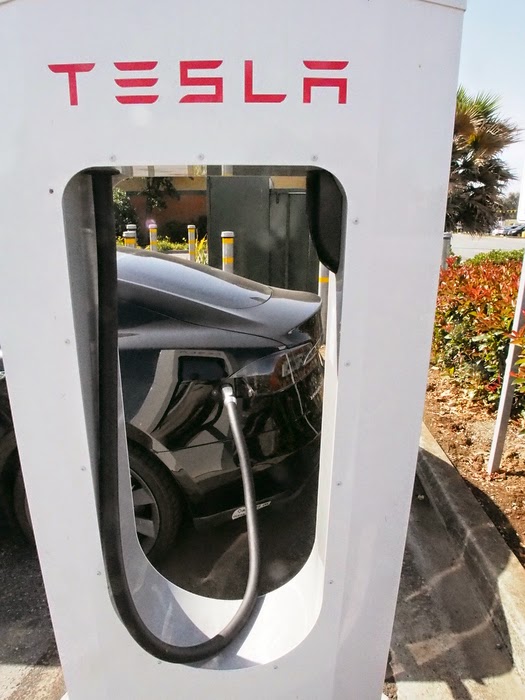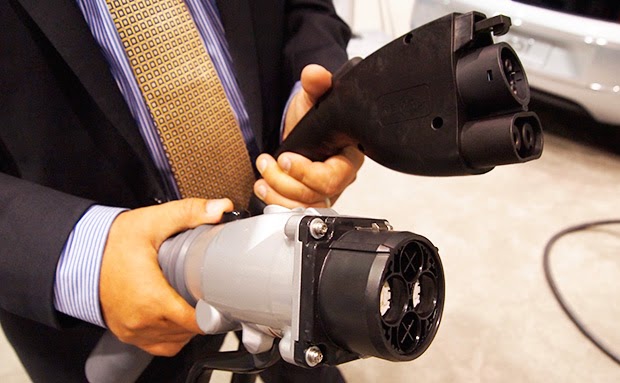Last week, a partnership announcement between BMW, VW and ChargePoint looked to me that it was slanted towards the ComboCharging System. In other words, it looked like a continuing salvo in the DC Fast Charging market-share war between the Japanese automakers (Nissan et al) and the German/US automakers. Today, after reading a couple other announcements and some further info on the BMW/VW/CP deal, the situation looks much better. Instead of the automakers hunkering down in competing camps, there may be a rapprochement going on.
Last summer I was able to attend the PlugIn 2014 conference in San Jose, CA. The meeting on DC Fast Charging the panel contained representatives from both BMW and Nissan, in other words the two leading automakers on the CCS and CHAdeMO sides of the DC Fast Charging tug-of-war. For my question I had to ask them about the chance of any kind of agreement between the two sides. The Nissan representative recognized the pragmatic need to deploy dual-protocol DC Fast Charge stations – because the other automakers (BMW et al) are finally beginning to start delivering ComboCharging System cars – while reiterating the need for continuing to deploy CHAdeMO charging support.
For the Nissan answer to be that dual protocol DCFC is necessary, is a sign that the DCFC market is moving in the right direction. Nissan’s prior actions was to move as quickly as possible on CHAdeMO deployment in an obvious move to gain market-share, even though the auto industry (through the SAE Committee) had chosen against adopting CHAdeMO. The result has been a three-way tug-of-war between the CHAdeMO, CCS and SuperCharger (and Chinese) camps over DC Fast Charging standards![]() .
.
The market-share battle doesn’t help us consumers one bit. What we need is cars and infrastructure that let us get fast charging anywhere without worrying over the charging protocol standards battle.
 |
| SuperCharger cord doesn’t fit the CHAdeMO socket |
In other words, this is the VHS-BetaMax battle all over again. Just as we Beta VCR owners were frustrated at the small selection at the video rental stores, electric car owners are frustrated when arriving at a DC Fast Charging station only to learn the charging plug doesn’t fit our car.
For the automakers to recognize the pragmatism of deploying dual-protocol fast charging stations is a big step in the right direction. It’s not perfect, because there’s still a battle over Tesla-versus-everyone-else.
Indeed, that’s what happened in the recent string of three major announcements from different sides of this market-share battle.
BMW, VW, ChargePoint announce two charging station corridors – one on East Coast between Washington DC and Bostom – the other on the West Coast between San Diego and Portland. These will, according to Tom Moloughny’s information![]() , be dual-protocol DCFC’s unlike the interpretation I came up with
, be dual-protocol DCFC’s unlike the interpretation I came up with
Nissan, Kansas City Power and Light, and ChargePoint – major expansion of charging infrastructure in the Kansas City area, including a significant number of dual-protocol DC Fast Charging stations
NRG eVgo reiterating their commitment to build Freedom Stations in California![]() . They have 60 stations in operation, each with dual DCFC units supporting both CCS and CHAdeMO, and have another 52 in various stages of construction.
. They have 60 stations in operation, each with dual DCFC units supporting both CCS and CHAdeMO, and have another 52 in various stages of construction.
Three major announcements, within the last two weeks, all supporting dual protocol DC Fast Charging infrastructure. This is a sign we’re heading in the right direction.
One of those announcements was from Nissan, giving concrete evidence of their commitment to dual fast charging standards.
Even though the car makers are still waging their standards battle, the customers aren’t disadvantaged. It would be as if Blockbuster Video had made sure to keep an equal stock of VHS and Beta copies of every movie in the store, back in the day. It doesn’t matter what DC Fast Charge socket is on our car if every charging station supports all charging sockets.
The automakers can keep their standards war going and we wouldn’t care because we’d still be able to charge our cars.
 The exception to this is Tesla Motors. The announcements above are for dual-protocol charging stations, not triple-protocol. That means the Tesla SuperCharger infrastructure is still a separate thing from the dual-protocol infrastructure being built for the CHAdeMO and ComboCharging System vehicles. Meaning that a CHAdeMO or CCS car could arrive at a SuperCharger station hoping for a fast charge, and get frustrated at the charging socket incompatibility.
The exception to this is Tesla Motors. The announcements above are for dual-protocol charging stations, not triple-protocol. That means the Tesla SuperCharger infrastructure is still a separate thing from the dual-protocol infrastructure being built for the CHAdeMO and ComboCharging System vehicles. Meaning that a CHAdeMO or CCS car could arrive at a SuperCharger station hoping for a fast charge, and get frustrated at the charging socket incompatibility.
For their part, Elon Musk is repeatedly telling everyone that Tesla is open to the other automakers adopting the SuperCharger system. Under certain conditions.
I see in online chatter many people saying they want the car makers to do so, but there isn’t any apparent action from the car makers. Instead we have BMW, Kia, Nissan, and VW and all installing dual protocol CHAdeMO/CCS charging station infrastructure. (Kia, along with rolling out the Soul EV in California, installed DCFC’s at 17 Kia dealerships in California)
Fast Charging is very important for further electric car adoption. It’s what gets us closer and closer to replicating the Road Trip experience with an electric car.
The advantage the SuperCharger system has over the others is solely about the charging speed. With a 120 kiloWatt charging rate, the SuperCharger puts about 300 miles of range into a Model S per hour of charging. The CHAdeMO/CCS camp instead runs at about 50 kiloWatts (or less), giving a much lower rate of range gain per hour of charging.
On a long trip the charging rate is what limits the overall speed of the trip. From Tesla’s standpoint, JB Straubl had told me they see the CHAdeMO/CCS efforts as slow charging. Anyone wanting a proper electric road trip would agree. While CHAdeMO/CCS is 10x faster than level 2 charging, it’s less than half the speed of the SuperCharger.
Note to car companies and charging infrastructure operators: What we the customer need is
Fast charging that’s as fast as humanly possible (300+ miles range per hour of charging is a good start)
Ubiquitous fast charging along highways between major cities
Either a single fast charge standard, or working with charging station & infrastructure makers to support all charging standards at all stations
- Highway design could decrease death and injury risk, if “we” chose smarter designs - March 28, 2015
- GM really did trademark “range anxiety”, only later to abandon that mark - March 25, 2015
- US Government releases new regulations on hydraulic fracturing, that some call “toothless” - March 20, 2015
- Tesla Motors magic pill to solve range anxiety doesn’t quite instill range confidence - March 19, 2015
- Update on Galena IL oil train – 21 cars involved, which were the supposedly safer CP1232 design - March 7, 2015
- Another oil bomb train – why are they shipping crude oil by train? – Symptoms of fossil fuel addiction - March 6, 2015
- Chevron relinquishes fracking in Romania, as part of broader pull-out from Eastern European fracking operations - February 22, 2015
- Answer anti- electric car articles with truth and pride – truth outshines all distortions - February 19, 2015
- Apple taking big risk on developing a car? Please, Apple, don’t go there! - February 16, 2015
- Toyota, Nissan, Honda working on Japanese fuel cell infrastructure for Japanese government - February 12, 2015









